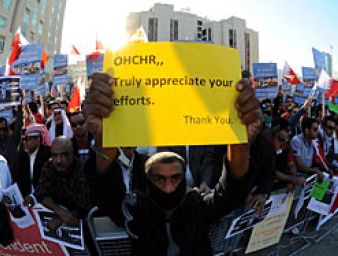Cambodia - 20 years on from the Paris Peace Agreements
21 October 2011
Twenty years ago, on 23 October 1991, 19 governments gathered to sign the Paris Peace Agreements which offered a comprehensive political settlement aimed at ending the “tragic conflict and continuing bloodshed in Cambodia”.
Conflict had convulsed the country for more than twenty years, with violence and bloodshed reaching unimaginable levels during the 1975-1979 Khmer Rouge regime when an estimated 1.7 million people lost their lives to violence and famine.
When the Agreements were signed, the Khmer Rouge still controlled parts of the country and fighting was on-going. The Agreements not only laid out the process for ending the conflict, but for the building of a just and democratic Cambodia, anchored in human rights and the rule of law.
Under the terms of the Accords, the United Nations would send a mission to Cambodia (UNTAC) until 1993 which would supervise the ceasefire, prepare the country for a new Constitution and for free and fair elections. Importantly, the UN mission was explicitly mandated to foster “an environment in which respect for human rights shall be ensured” so that the policies and practices of the past should not return.
Although the conflict took some time to end, the early 1990s saw the establishment of many institutions critical to a democratic state, including a functioning parliament.
The Agreements also recognized the need for on-going monitoring of the human rights situation in the fragile democracy. Following the 1993 general elections, the United Nations set up an office in Cambodia focused on the protection and promotion of human rights.
Since then, the Human Rights Office in Cambodia has been active across a range of rights issues and is currently focusing on four areas: support for prison reform; the protection of fundamental freedoms and development of civil society; the protection of land and housing rights; and support for legal and judicial reform.
At the same time, an independent expert was appointed by the UN to monitor and report on the human rights situation in Cambodia. Since 2009, this expert (called a special rapporteur) has been Professor Surya Subedi of Nepal.
Commenting on the two decades that have passed since the signing of the Agreements, Professor Subedi noted that peace and stability have brought “enormous dividends” to the country.
However, Subedi said, “the Agreements will remain relevant until their vision is a reality for all Cambodians.”
21 October 2011


